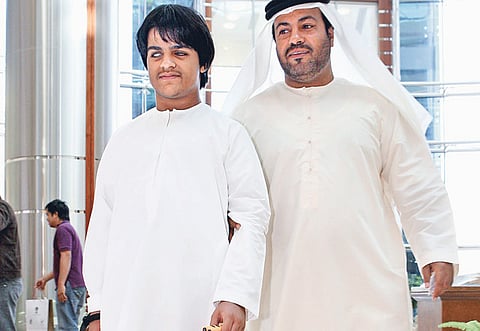Firms urged to train visually impaired
Official says physically challenged can succeed in organisation with faith in themselves

Abu Dhabi: Organisations in the UAE should provide short training programmes to help improve the capabilities of visually challenged individuals who have the right to excel in their organisations, a visually challenged senior Emirati official has said.
"I am a living example of a visually impaired individual who slowly worked his way up; it's not impossible, all it needs is some faith, hope and more community awareness regarding visually impaired people," Ahmad Al Mulla, the Community Relations Manager of Tamkeen, told Gulf News on Tuesday on the sidelines of the first international forum on technology for visually impaired.
Tamkeen provides technical solutions for the visually impaired. The organisation works towards improving human resource standards through training and using modern scientific methods.
Al Mulla finished his bachelor degree from Helwan University, Cairo, and worked as a junior employee in a UAE-based company for a short while. He then rose to a senior position in a short while.
Some of the challenges in meeting the visually impaired across the UAE, said Al Mulla, include lack of continuous professional development, lack of reading screens, and uncomfortable spacing environment in offices.
Community awareness
"There's definitely improved community awareness in the UAE and across the world. There are zero unemployed individuals with sight problems in the UAE, for instance. However there are vital needs that need to be enhanced in organisations, such as creating the right space for the person to move around comfortably, and providing Braille readings and sound equipment in companies," he said. Al Mulla said that companies can download and apply for a training programme called Oracle that has handy maps.
Al Mulla was among the first batch of students in the UAE to learn how to use a sound programmed computer, especially designed for the visually impaired back in 1999.
"Ahmad is an example of what a visually impaired person can accomplish. I have eight different softwares for the visually impaired, each with a built-in sound software, and that helps students with visual impairment surf the internet, work on programmes, design things, and the list goes on," said Abdul Wahab Mustafa, an IT consultant at the General Information Authority, who taught Al Mulla how to use a computer.
According to Steven Rothstien from the Perkins Schools for the Blind, there are over 5 million visually impaired and deaf students across the world who do not go to schools.
"With the right adoptive technology and Braille literacy, children with special needs can get the education they deserve. Teachers should also be trained on updated technology that can help improve their work with visually impaired students. Working with parents is equally important," said Rothstien.
Dr Mona Hadidi from the University of Jordan said research conducted in some Arab countries has shown some of the main challenges facing visually impaired individuals include lack of financial support and training for teachers and families on technology for the visually impaired.
World of darkness: Specks of brightness
- 300 people are visually impaired across the UAE.
- About 250 of them have received Braille training in text and on the computer.
- 3,000 education books are printed yearly for students from Grades 1-12 (printed by Zayed Higher Organisation for Humanitarian Care, Special Needs)
- None of the 300 are unemployed.
- 200 visually impaired students go to normal schools.
- The number of students who continue their higher education remains unknown, but is said to be low.
n 1,000 Perkins Brailler machines have been sold across the UAE.
n They cost Dh3,000-Dh3,500.
Source: Zayed Higher Organisation for Humanitarian Care, Special Needs.
Helen Keller
The famous Helen Keller, who was afflicted by an unknown illness, possibly scarlet fever or meningitis, which left her deaf and blind, was one of the first students to complete her higher education at Perkins.
In May of 1888, Sullivan brought Helen to Perkins School for the Blind in Boston, where a new world of friendship began for Helen:
"I joined the little blind children in their work and play, and talked continually. I was delighted to find that nearly all of my new friends could spell with their fingers. Oh, what happiness! To talk freely with other children! To feel at home in the great world!"
After that visit, Helen spent nearly every winter studying at Perkins: "In the school where Laura Bridgman was taught I was in my own country."
Helen studied French, arithmetic, geography, and other subjects.
She especially enjoyed the library of embossed books and the tactile museum's collection of bird and animal specimens.
Source: www.perkins.org
Do you know of anyone who is visually impaired? What obstacles do they face on a daily basis? What technologies do they use to improve their lifestyle?


